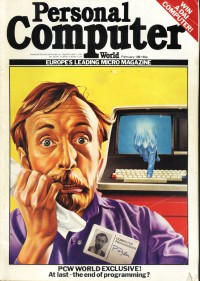2010-04-08»
Guy Kewney»I don’t know why but from the age of eight to I think fifteen, I just assumed every drawing of a bearded man in or on Personal Computer World was meant to be Guy Kewney. He was the model journalist to me– why wouldn’t he also be the model for all those techies PCW’s graphic editors had to draw?

Not Guy.
As a pre-teen, I was a Personal Computer World kid. I loved the binding, the glossy cover, the thick tall pages, the sprawling reviews, the narrow columns of crazy computer classifieds that would stand like columns over pages and pages and pages of dot-matrix printed listings at the back, the love-hate relationship with the dull business business that would dog it into the grey IBM years, the arty covers, the bearded pundits. But most of all I loved reading Guy Kewney, the beardyist pundit of all.
Cromemco and Nascom, Siriuses and Osbornes. They seemed like far-off planets, and Kewney seemed like some pipe-smoking Dan Dare, giving a jocular downbeat debriefing in the mess, of his latest voyages with the Osborne or the COSMAC ELF, even when the most exciting software they did was inventory management. Kewney made even dull corporate machinations the stuff of high drama.
Aged 10 or 11, I would run around the house playing these elaborate fantasy games, muttering under my breath stage directions, and leaping from chair to chair in our living room. My adventures were set — and I am not joking here — in a 21st century where Apple-IBM and Sinclair-Acorn would heroically battle as giant zaibatsu corporations flying amazing robot battalions around in space. The dramatic climax would always involve me, as the captain of the flagship of the corporate fleet, controller of the inventory, master of the Science of Cambridge, shouting some secret password that would override all the command centers of the opposing army. My favourite Words Of Power in these fantasies was Angelo Zgorelec!, the mystical founder of PCW, whose name appeared on every issue’s masthead, and who I imagined to be a Tharg-like being of supreme wisdom (and great aural resonance).
But the person from whose writing I drew the strategies and the battles and the drama of those corporate tussles was Kewney.

Also not Guy.
I still remember one of his columns. In it, Kewney, boggling at the effort to which software publisher Acornsoft had gone to copy-protect software , published the one-line command for rendering its primitive DRM completely useless. I don’t remember the details, but I do recall just stopping and staring and then laughing and rocking in glee at the audacity of it, and wondering why no-one ever said all those other hidden incantations that I was sure existed out loud in other newspapers and magazines. Then I watched him defend his decision after a barrage of outraged readers (swamped by those who cheered him on) chastised him the next month. It really stuck in my mind as this example of the power of words to unwind elaborate but unsustainable practices.
John Lettice says in his obituary that PCW had to pay Acorn for that Kewney column. They shouldn’t have. And if they had to because of the law, well then, the law was wrong: spelling out these magical words of power, causing corporate battalions to flash out of existence at a single, carefully-researched command, really was Kewney’s job, and he did it masterfully.
I met him once. I’d just started writing for PCW myself, in about 1990, only to discover that my rapid promotion to the flagship of the British tech mag fleet was because they’d sacked all the old guard in a labour dispute and were desperate to fill those gaping pages with cheap young new writers. I tagged along to some press conference and actually overhearing David Tebbutt or Christopher Bidmead or some other Elder God complaining loudly about the wide-eyed children who had stolen everyone’s jobs, yet wouldn’t stop babbling about how honoured they were to meet them.
After that, I always averted my eyes and ceased to bother the titans. When I finally met Kewney, I think I just stood awkwardly by his side, surely making him even more uncomfortable than he must have been.
Or looked. To me, some idiot kid, he did not look well. When I said this to equally squeaky kid co-worker, they told me he had always looked ill, a boney, pale man who was constantly being stabbed with allergies and posture problems, aches and pains and deadlines and all-nighters, triumphing over the all to file his copy mere hours before printers might knock down his door and wring his neck.
I found this hard to believe, because he always looked so erect and noble in his byline pictures. Also in all those cover paintings of him. And in those games where he flew across the corporate landscape, making the world change with a word or two. It just made him seem all the braver.
Now Guy Kewney is gone, and I have this beard, but the words of power are all gone too. And frankly, I do not feel too well myself. Timor mortis conturbat me.
